This is Why Omnichannel is the Future of the Retail Industry The Omnichannel game is yet to be played in the true sense of the world in Indian retail
By Vipul Mathur
Opinions expressed by Entrepreneur contributors are their own.
You're reading Entrepreneur India, an international franchise of Entrepreneur Media.

One of the most fascinating aspects of India's growth story is the ever-evolving nature of the myriad industries that are driving this journey. One industry that has burgeoned and benefited in more ways than one, particularly with the growing dominance of E-commerce, is Indian retail, one of the most important cogs of the nation's growth story wheel.
With the focus becoming more and more customer-centric in a world that has embraced technology, E-commerce today offers a sea of product ranges, discounts, personalization through faster deliveries at specifically chosen times, fast-tracked and unquestioned returns, and more. These factors have revolutionized the customer experience, which is only going to evolve for the better in the coming years, as more and more trends shape the industry going forward.
Changing consumer expectations and the ensuing Omnichannel phenomenon
One particular trend that is currently accentuating the E-commerce business stems from a very interesting context. It validates that the boom in online sales can not only be attributed to the dynamic E-commerce model, but also to the changing consumer psyche that expects more and more convenience in the shopping experience.
The business response to this expectation is Omnichannel, a retail phenomenon that binds all channels of sales seamlessly through technology. Successful Omnichannel originations have been able to merge their functions of the supply chain, product, marketing, and retail to create a frictionless experience. Omni is not just a new sales channel.
It is, in fact, a new mindset of an organization to create consumer delight. It is this new mindset that is crucial in terms of letting go of traditional practices and adopting new practices for reduced lead times, like moving inventory closer to the consumer through decentralizing. The new mindset also manifests into the investment in disruptive technology.
It is interesting to note that Omni solutions are being created in various branches under India's growing retail tree. In the food sector, the transition has been encouraging. Swiggy, Zomato, Uber Eats and the likes have acquired a large consumer base already.
When it comes to the health sector, its fragmented nature means that Omni would play a huge role there to integrate the consumer daily health and wellness requirements, possibly through apps which would connect hospitals, pharmacy chains, wellness centres, supplements etc.
The challenges posed by Omnichannel
A recent McKinsey survey in Europe revealed that 80% of the top E-commerce executives agreed on their efforts towards Omni, but only 25% felt that they were on the right track. So what then is causing a hurdle for retail organisations to create effective Omnichannel?
One of the challenges is their ability to support it with an able supply chain system. Indian companies seem to have embraced Omni, but not necessarily without developing a crystal clear understanding of the consumer need and the ability to leverage the data that is being produced.
Indian retail has also struggled with mapping the real-time inventory at stores, and e-commerce ventures that were established on the premise of shorter delivery have found it restrictive to operate on the same lines. In my view, the ideal way to go would be to test Omni in a couple of stores and learn from the experiment, before taking it nationally.
Weighing in the real world relevance of Omnichannel in Indian retail
A hot argument in retail circles is will Omni ever have more than single digit sales share in times to come? Only time has the right answer. One view is that Omni has come and left without making much of a business impact in Indian retail, but I am of the firm view which suggests the opposite. In my opinion, Omni is yet to unlock its full potential in India, especially when Indian E-commerce is expected to stop burning money in discounts, in a bid to lure consumers.
Possibly, consumers may find the combination of physical and virtual retail the most convenient option in times to come. And in turn, brands may find it as a logical and viable method to keep exorbitant retail costs under control and wean away from the E-commerce burn.
The real world challenges of Omni executions are blurring the impact of its relevance in Indian retail, but that does not alter its real-world benefits. The optimist in me believes that the Omnichannel game is yet to be played in the true sense of the world in Indian retail, but will shape its future. Exciting times ahead!











